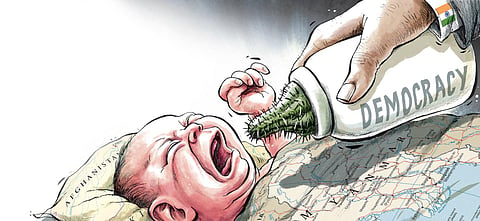

The recent Myanmar visit by Indian Foreign Secretary Harsh Vardhan Shringla and New Delhi’s announcement of a gift of one million Covid vaccines to the nation are evidence to political realism triumphing over adventurist neighbourhood policy that deploys democracy as a tool, notwithstanding the secretary’s call for restoring democracy in the country. It all coincided with the UN Security Council taking a more realistic view about the Taliban rule in Afghanistan, another of India’s neighbours.
This is Shringla’s second visit to Myanmar in as many years. Ahead of the national elections that Nobel laureate Aung San Suu Kyi’s National League for Democracy (NLD) won in November 2020, he had met with the nation’s leadership in a unique combo that included Indian Army Chief Gen M M Naravane, indicating New Delhi’s eagerness to strengthen bilateral relations on the one hand and the fledgling democratic credentials of Myanmar on the other. The NLD swept the polls better than the previous one five years earlier. Yet, it lost to the February coup this year. New Delhi has since readjusted to the realities of bilateral relations involving the immediate neighbourhood after having expressed early concerns over the coup, and more recently to a Myanmar court sentencing the septuagenarian to a four-year jail term.
Did India delay making up with the Tatmadaw, which is the government in power in Naypyidaw? Independent of India’s claims to be the world’s largest democracy, there are those who have sought to argue otherwise from time to time, so non-interference in the name of democracy is not a comforting option. It is unlike New Delhi deploying the Responsibility to Protect (R2P) in Bangladesh (1971) and Sri Lanka (1983)—where immediate relief awaited the refugees who had crossed into India—long before the terminology obtained international credence. Political initiatives and military participation only followed.
A similar question arose when, after taking back power in Afghanistan after a 20-year-long overstay and overkill by the US military, Taliban seemingly offered a hand to India. After joining the West in distancing itself from the Taliban, with past memories still hanging heavily, New Delhi soon readjusted itself to the realities on the ground. It needed to stay at least not on the wrong side of the Taliban lest there could be a repeat of the outfit playing second fiddle to Pakistani ISI masters on issues of cross-border terrorism.
Whole-process democracy: In context, China’s claims, not long before India’s new Myanmar initiative, of being a ‘whole-process people’s democracy’ is laughable, to say the least. Yet, there may be some truth to the Chinese apprehension that the US’s use of democracy as a tool of foreign policy is akin to a weapon of mass destruction (WMD). The reference is obviously to America under the erstwhile Bush administration using democracy as a foreign policy tool along with terminologies like WMD and Axis of Evil to brand—and destroy—nations that did not kowtow to Washington. Iraq under Saddam Hussein is a prime example, starting with the American deployment of WMD, which was there only in a PhD thesis of a British scholar.
It is in this context that China accused US President Joe Biden of hosting a virtual democracy summit as an attempt to revive Cold War ideological rifts, which Washington has since promptly denied. Yet, the US has also not given any credible and convincing explanation for the hurried convening of an online democracy summit, inviting only 110 of 193 on the UN’s rolls. Does it mean that the US has not only branded the remaining 83 UN member states—like Sri Lanka, the region’s oldest elected democracy—as undemocratic, but included Pakistan, which is a sham democracy?
The US invitees list for the democracy summit included only four South Asian nations, including India, Nepal and Maldives. The question thus arises as to why and how Bangladesh and Bhutan, which is the latest among monarch-volunteered democracies in the post-War global order, left out? In all this, the US’s insensitivity to what Bangladesh dubbed the unilateral American sanctions on the nation’s Rapid Action Battalion (RAB) stood out as it came about in the golden jubilee year, month and week of the nation’s Independence.
Interference in internal affairs: In recent years and decades, however, some of India’s neighbours have charged the nation with interfering in their internal affairs. Nepal, Bangladesh under Khaleda Zia earlier, and Sri Lanka too, had said so. Our closest friend Bhutan was not an exception after the incumbent government claimed that India had cut fuel subsidies and stopped gas and kerosene supplies to influence domestic voters ahead of what was only the second National Assembly polls in 2013.
More recently, Maldives’ former president Abdulla Yameen, fresh from Supreme Court-ordered freedom from imprisonment and electoral disqualification, has added a new dimension to his opposition coalition’s ‘India Out’ to ‘India Military Out’ campaign. In post-release rallies, Yameen recalled India shooting off three democracy-centric letters after the Maldivian Supreme Court’s 1 February 2018 verdict on freedom for his arch rival and former president Mohammed Nasheed. In the 2013 elections, when he had won against Nasheed, Yameen had indicated that New Delhi was batting for his rival.
Something is amiss in all this and New Delhi cannot be seen as deploying the democracy war cry on its immediate neighbours as indiscriminately as Big Brother America does with its superpower status in every sense of the term from a safe distance. India’s sworn policy of Vasudhaiva Kutumbakam stands for doing business with the governments that nations have. Wanting leaders of its choice—a superpower trait—is not in conformity with this policy.